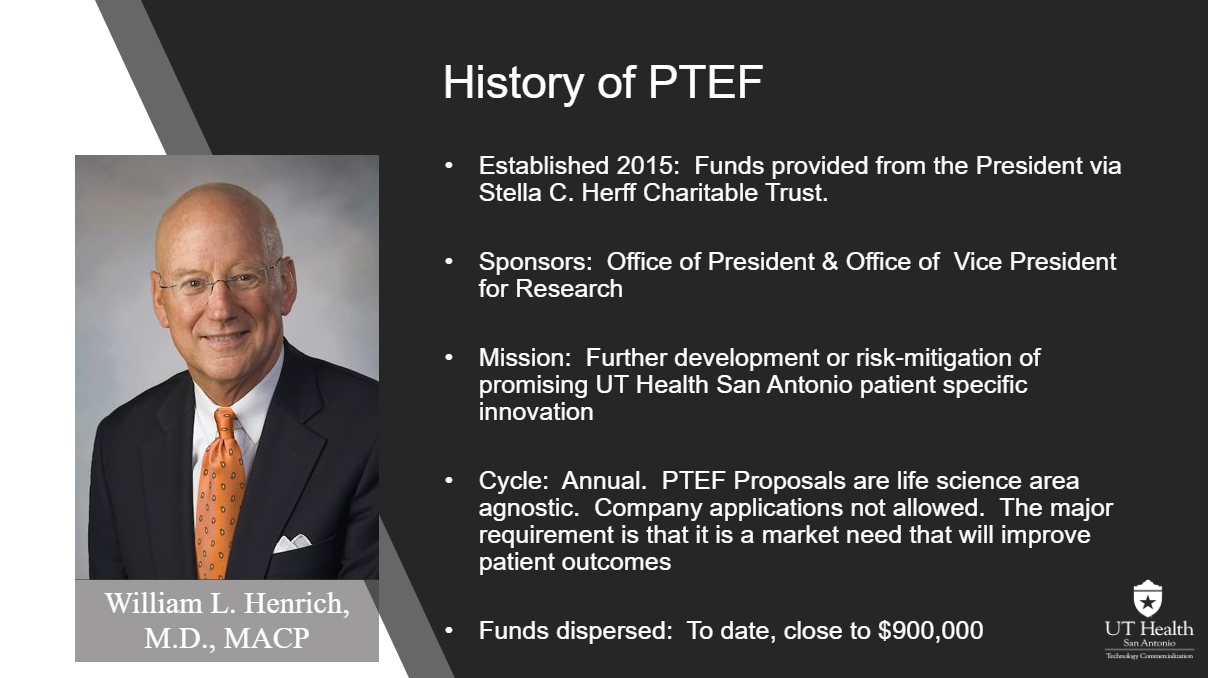Announcing the President’s Translational and Entrepreneurial Research Fund 2020 Awards
September 17, 2020

With no endpoint in sight for the pandemic, the Office of Technology Commercialization (OTC) executed on a key entrepreneurial principle—adapt to market needs.
John Gebhard, PhD, assistant vice president, OTC, praised the team for pivoting to a successful virtual platform for this year’s President’s Translational and Entrepreneurial Research Fund (PTEF), which was coordinated by Meagan Rockne, technology commercialization assistant, and Lindsey Dostal, program coordinator.
“Even though we were working remotely, our whole team really banded together for preparing PTEF in a virtual platform,” shared Rockne. Drawing on her experience in executing virtual events, Rockne understood how important it was to have dry runs and advance troubleshooting. “Everyone pitched in,” she added, “Because we believe innovation is key to ending this pandemic, and PTEF can facilitate that.
”While the pandemic has brought restrictions, it also presented an opportunity for the OTC to pilot an idea the office had been exploring: Engage as many local and national investors and subject matter experts, to showcase UT Health San Antonio’s innovative science. Noteworthy is the expanded audience this year. PTEF is typically restricted to a small event of about 20 people. The over seventy representatives of the biosciences ecosystem spanning from the East to West coasts of the U.S. was considered a huge win for UT Health innovation. Virtual pitches delivered by UT Health San Antonio researchers on their technologies were met by significant interest from investors and angels. In FY19 investigators disclosed a record 74 inventions to the OTC, a testament to the role they play in UT System’s world ranking as third for utility patents as noted in this report.
Another noteworthy first for PTEF was theparticipation of graduate students and the pitch givenby Daniel Chupp, PhD candidate studying molecular immunology and microbiology in the integrated biomedical program in the lab of Paolo Casali, MD. Chupp has been working with OTC mentors, John Fritz and Sean Thompson, on the commercializationof a novel humanized mouse model to study antibody production.
“This is my dissertation work and to have these funds awarded really validated my research” said Chupp, “My goal is to translate this science through commercialization and be able to apply it to medical practice. This, to me, is where we can have the most impact in helping society.”
Chupp felt more confident in his pitch skills, which he honed this past year through his participation in the NSF iCorps and the TAMEST poster session. He conveyed his passion when sharing how the funds awarded would further studies with these mice which have been immunized to produce SARS-CoV-2 human antibodies. The PTEF dollars will be used to validate these antibodies and better understand how the virus binds to our cells.
The rigorous process to secure a patent is only the first step of the translational research pathway. PTEF and TechNovum, the accelerator at UT Health launched last year, are examples of how OTC can bridge the science and commercialization ecosystems through implementation of initiatives designed to assist investigators in the development of early stage technologies and assessing their market potential.
Robert De Lorenzo, MD, professor and research director in the Department of Emergency Medicine, was in the inaugural TechNovum cohort in 2019. He benefited from the formal curriculum and pitch given at Demo Day last November. The prior preparation was invaluable since the virtual PTEF pitch came during the midst of a grueling schedule with long hours intubating COVID-19 patients at University Hospital. Dr. DeLorenzo is passionate about innovating and bringing to market a more modern and portable breathing tube. This devicecould very well be celebrating its centennial since it is “virtually identical to what was used in 1920...” For Dr. DeLorenzo and his team, the goal is to continue to iterate the prototype and seek Food and Drug Administration approval by 2022. Below are this year’s PTEF awardees.
| PTEF 2020 Awards | |||
|---|---|---|---|
| Investigator | Job Title | Project Title | Type of Technology |
| Sepehr Bahadorani, MD | Specialitst, Opthamology |
Computer-aided analysis of full-field electroretinogram |
Medical Device |
|
John Calhoon, MD |
Professor and Chair, Cardiothoracic Surgery |
Safe IV Project |
Medical Device |
|
Daniel Chupp, PhD candidate |
Graduate Student, Integrated Biomedical Studies |
Novel humanized mouse platform supporting Natural Human antibody production |
Therapeutic |
|
Robert De Lorenzo, MD |
Professor/Clinical, Emergency Medicine |
Portable Suction Device for Airway Management in Emergencies |
Medical Device |
|
Vaida Glatt, PhD |
Assistant Professor, Orthopaedics |
Biomimetic Hematoma: Novel Carrier for the Delivery of Growth Factors to Enhance Bone Healing |
Therapeutic |
|
Daniel Lodge, PhD |
Associate Professor, Pharmacology |
A drug combination to reduce the abuse liability of opioid medications |
Therapeutic |
|
Dimitrios Miserlis, MD |
Assistant Professor, Vascular Surgery |
VascuX Robotics |
Medical Device |
|
Alexander Papanastassiou, MD |
Associate Professor, Neurosurgery |
Rook Procedure Scheduler |
Medical Device |
To learn more about the PTEF 2020 technologies, view this PDF.
The President’s Translational and Entrepreneurial Research Fund (PTEF), established at UT Health San Antonio in 2015, is made possible by endowment earnings from the Stella C. Herff Charitable Trust and strategic funding resources from the Office of the Vice President for Research and the Office of Technology Commercialization (OTC).
PTEF is intended to award early-stage seed funds to projects that demonstrate a high probability of being commercialized but lack resources to advance to the next pivotal stage, such as building a life science partnership or creating a startup company for their product.
